Paul Starick: Nuke sub impacts start rising from the depths | The State
Nuclear submarines from America could herald a historic game-changer but that can’t start until the state makes some major moves, writes Paul Starick.
Opinion
Don't miss out on the headlines from Opinion. Followed categories will be added to My News.
The direct and early impacts of Australia’s momentous decision to embrace nuclear submarines – in a program centred on Adelaide – are becoming more obvious.
A week after the high-powered unveiling of the AUKUS agreement, the prospect of Australia leasing American or British nuclear-powered submarines has been floated by Finance Minister Simon Birmingham and Defence Minister Peter Dutton.
On another strategic front, the UK is proposing that two or three of its nuclear submarines have a “persistent presence” in Australian waters and be serviced here.
These vessels would be based in Perth, with some opportunity for Adelaide to start training personnel and building capability for the construction and sustainment of future Australian-built nuclear submarines.
Likewise, the US also reportedly has capacity to deliver or use nuclear submarines around Australia within years. The prospect of US delivery of submarines raises questions about the strength of the AUKUS commitment to build at least eight nuclear-powered submarines in Adelaide.
On the infrastructure front, a portion of the task force assessing the Australian nuclear submarine build will be based in Adelaide, primarily to study and determine the impact on Osborne Naval Shipyard.
There will be significant changes required to the Port River shipyard’s northern side because of the axing of the $90bn deal for French firm Naval Group to build 12 diesel-electric-powered submarines.
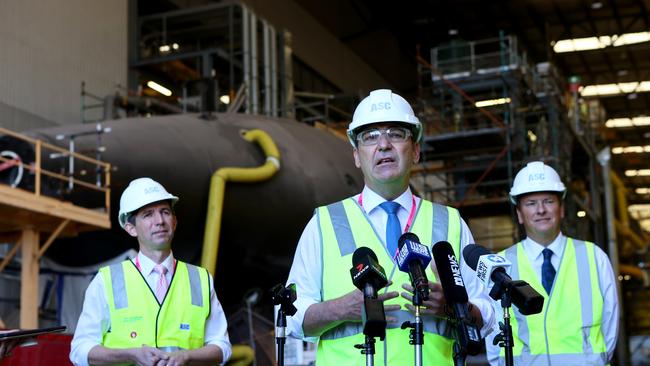
Nuclear-powered submarines are about three times bigger, requiring vastly larger infrastructure. Clearly, there also is the added complexity posed by nuclear fuel cells, even if they are fully sealed when imported from the US.
This is part of the 12 to 18-month process of assessing the platform, design and infrastructure to be transferred from the UK and the US to Australia to start the construction program.
The deployment of UK and US submarines to Australia – and potential leasing – would be expected to have a greater impact in Perth. This is where the fleet of six Adelaide-built Collins- class submarines is based. At a very simple level, larger wharves would need to be built to dock the submarines and, if leasing went ahead, more accommodation and infrastructure for crews and the boats would be needed.
The potential of the AUKUS agreement and nuclear submarine program should be clear, even if only because of the geopolitical significance of the US sharing its tightly held nuclear submarine secrets for just the second time – the other was with the UK in 1958.
But looming state and federal elections have amplified – and, in some cases, distorted – the legitimate questions being posed by the Coalition’s political opponents.
For example, federal Labor foreign affairs spokeswoman Penny Wong repeatedly has expressed strong support for the US alliance and backing for nuclear-powered submarines, based on national security briefings. Labor also has accepted assurances that there will be no requirement for a domestic civil nuclear industry, no acquisition of nuclear weapons, and that the AUKUS agreement would be compatible with the nuclear non-proliferation treaty.
“The government has made clear these conditions can be met. We will hold them to these commitments,” Senator Wong said in a speech to the US Studies Centre on Thursday.
“More broadly, it is not unreasonable to expect the Morrison-Joyce government to inform the Australian people on the strategic, environmental, commercial and political ramifications and consequences of this decision.”
As Senator Wong argued, these include questions about Australia’s sovereign capability, control of foreign technology and capability and implications for the design, assembly, operation and maintenance of nuclear-powered submarines.
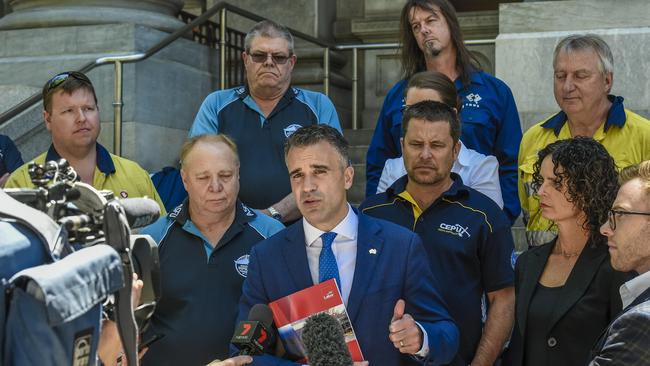
Her speech was a measured and sensible critique. By contrast, state ALP leader Peter Malinauskas and frontbencher Tom Koutsantonis have bluntly hammered home questions about jobs for South Australia.
While it is more than appropriate for the state Labor Party to advocate strongly for SA jobs, Mr Malinauskas displayed his usual nuance and pro-US ideology by affirming his support for the alliance and acknowledging national security imperatives only briefly – in a few sentences opening a press conference on September 16.
Independent senator Rex Patrick, a former submariner, has backed the scuttling of Naval Group but argued this should have been done for non-performance, to limit the cost to taxpayers. But he has questioned how long Australia will wait for submarine capability.
The AUKUS agreement clearly is a huge deal for Australia and Adelaide, with multiple security and technology benefits, particularly if its implementation is effectively and clearly scrutinised.
America’s nuclear secrets will reveal a rare opportunity
FRIDAY, SEPT 17: South Australia risks becoming mired in a kneejerk, mendicant and rent-seeking response to being at the epicentre of Australia’s most significant strategic shift since the United States alliance was forged – rather than assertively striving to capitalise on the enormous opportunity.
There are legitimate and important questions raised by the stunning axing of French firm Naval Group as the designer and builder of 12 submarines in Adelaide in a $90bn project agreed in 2016.
But the naive, small-minded, introspective and excessive focus by some politicians and commentators on jobs quotas betrays a misunderstanding – deliberate or otherwise – of both the history and potential future of naval shipbuilding in SA, along with its importance to the economy and national security.
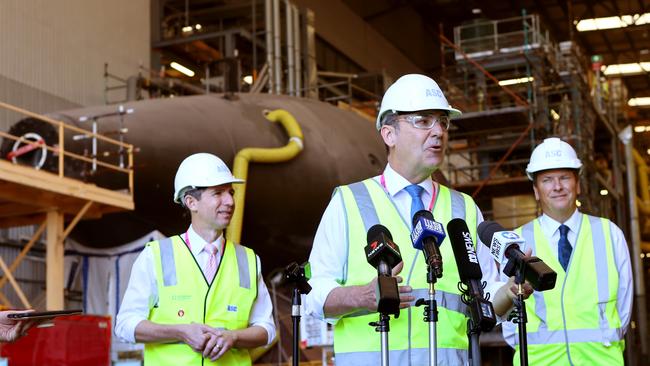
There can be no doubt that the opportunity posed by the US sharing its most tightly held nuclear submarine secrets, with SA at the heart, is a revolutionary and lucrative technology transfer.
With US major firms like Lockheed Martin and Raytheon already in place in Adelaide, SA must look to leverage investment, technology and jobs from AUKUS partners.
This is in their interests, because of the race to build submarine capability in the Indo-Pacific to counter China’s increasingly aggressive posture and its growing threat to Taiwan. In this arms race, submarines were needed yesterday. It is in the US and UK’s interest to build sovereign manufacturing capability in Adelaide, both to accelerate nuclear submarine construction to grow the allied fleet and reduce the risk of supply lines fracturing.
It must be remembered that AUKUS is a partnership, not an alliance. Australia has become grafted to the US and UK military/industrial complex. Just as US forces are likely to be based in Australia, we can expect more components to this deal beyond nuclear-powered submarines. Adelaide can be a new-age industrial hub, intimately linked to the world’s most powerful economy, rather than a military base.
There already is a beachhead, besides defence companies, in firms such as Amazon and the world-renowned Massachusetts Institute of Technology’s big data hub at Lot Fourteen. Political leaders should focus on maximising these investment and jobs opportunities, not demanding socialist job quotas. It must be remembered these are government-to-government talks with our most trusted allies, rather than with a commercial partner as was the case with Naval Group.
The obsession with jobs quotas stems from the Coalition being spooked by the prospect of losing Senate spots to a rampaging Nick Xenophon, who demanded at least 70 per cent of future submarine construction should be done in SA to stem a jobs crisis.
Responding on Thursday to the nuclear-powered submarine decision, state Labor leader Peter Malinauskas repeatedly emphasised that SA had gone from a locked-in $90bn contract with a 60 per cent local procurement guarantee – or quota – to nothing more than an 18-month consultation process and grave uncertainty.
ASC chairman Bruce Carter is a highly respected business leader, who has been a confidante of senior Labor and Liberal politicians. Asked about jobs quotas on Friday, he said Australia was an island, so needed to have the highest local content possible because spare parts could not be scattered globally. More than 90 per cent of Collins’ input is Australian.
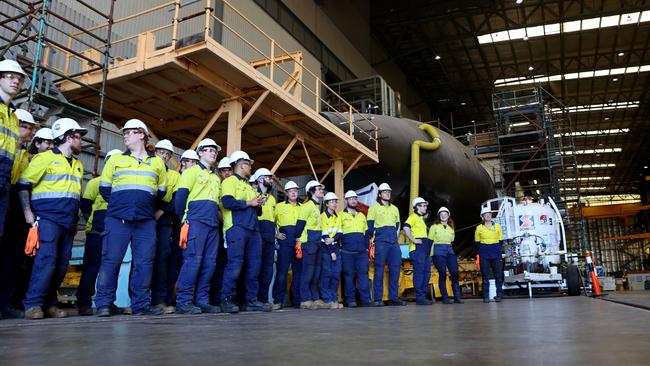
“There won’t be a need to put it into a contract, because for them to operate properly, you need to build to sustain,” Mr Carter said. “That’s the key thing – you build these things, but the cost of sustaining this as much as building. And if you want to sustain them, you want to be able to locate, through your supply chain, all the spares and appropriate parts to go into these complex machines like that.”
The case must now be proven for AUKUS and nuclear-powered submarines, which are not expected to hit the water until the end of the next decade. It will take 18 months to produce costs, designs, construction plans and other components.
It is legitimate to ask whether at least $2.4bn has been squandered in the latest of a series of political bungles that have bedevilled Adelaide naval shipbuilding projects. There are serious consequences of summarily dismissing Naval in favour of the AUKUS partnership’s nuclear-powered submarines, particularly for the jobs of shipbuilding workers and Australian firms that had banked their futures on being integrated into the supply chain.
But these are outweighed by the prospect of AUKUS unlocking well-paid jobs for generations of South Australians, if leaders work now to capitalise on the major opportunity presented by this momentous partnership with trusted allies.
Inside vaccine passport planning for SA
FRIDAY, SEPT 10: It’s long been inevitable that vaccine passports will be required for entry into bars, shops, gyms, public transport and other places across Australia.
Yet the reality is about to hit, because of the NSW decision to reinstate liberties for vaccinated people at 70 per cent double dose inoculation rates – expected as early as October 17.
Pubs, restaurants, gyms and retail stores will reopen to the fully vaccinated, but the unvaccinated will still be able to shop for essentials at critical retailers.
A similar “vaccinated economy” approach is to be tested in regional Victoria.
This is unleashing inevitable privacy concerns, primarily because of the lack of a detailed blueprint at a national or state level.
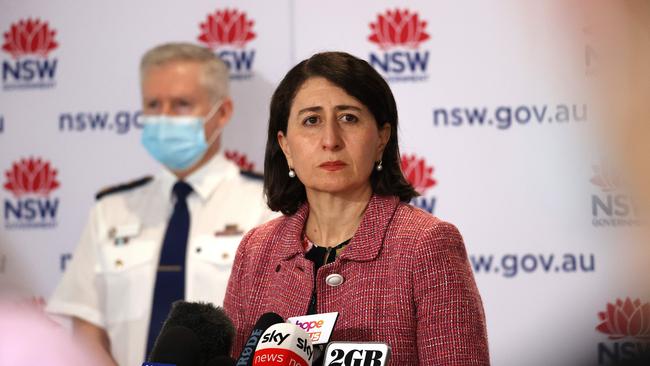
As the Australia Institute/Centre for Responsible Technology argued on Friday: “There is a place for vaccination passports but to get it right, safety and security risks must be addressed at the outset.
“ … A blueprint for the ideal vaccination passport should develop key principles like privacy by design, purpose limitations and data minimisation to ensure equity in this key public health policy.” Primarily for these reasons, South Australia’s preferred model is incorporating the digital Covid-19 vaccination certificate generated by the Medicare Express Plus app into the mySA GOV app.
The latter is used for Covid-safe check-ins required to aid contact tracing in the event of an outbreak.
It also stores digital credentials including driver’s licences, vehicle registrations, proof of age card and occupational licences.
Uploading the Covid-19 vaccination certificate would require the state government database underpinning the mySA GOV app to “talk” to the Australian Immunisation Register – the database that stores records of Covid-19, flu and other inoculations.
Covid-safe check-in data is securely stored within the Department of the Premier and Cabinet, for use only by health officials.
Authorities believe this would ease privacy and data security concerns, given the widespread adoption of the app.
The passport would work by displaying a green tick to indicate full vaccination, on the same screen it does now to indicate the check-in and the venue’s name.
Venue staff would then ask for verification just as they can now with check-in status. This poses the risk of increased or excessive bureaucracy being imposed on business and venue staff, along with the security risks involved in turning away the unvaccinated.
It is understood the direction being considered by national cabinet for state-based check-in apps involves the check-in screen also displaying when people are fully jabbed, not yet fully jabbed or exempt.
National cabinet also is considering adding a QR code to the Covid-19 digital certificate produced by the Medicare app, which already can be added to Apple or Google wallets.
Under scenarios still being worked through, this would involve authorised users scanning the QR code to verify vaccination status.
This would work in the same manner in which gym members, for example, can scan a QR code pass to gain entry.
But it creates much greater technical and cost issues for businesses, particularly those that do not have QR code scanning equipment.
This means using the mySA GOV app is simpler, because venues already have to place prominently a QR code for patrons to scan.
Australians travelling overseas, whenever that might be, can get an international app and use a visible digital seal – a QR code others can scan overseas as evidence of immunisation.
For returning Australians, the details will be linked to passports – they won’t need to show anything.
SA is now imposing requirements for evidence of negative Covid-19 tests in the 72 hours before entering the state for most essential travellers who have been in NSW, ACT or Victoria’s restricted zone.
This will prompt debate about a standard, secure and certified method of producing this evidence.
Vaccine passports and health passes in France, Italy and Israel enable 72-hour temporary passes after negative tests for the unvaccinated.
In late November or early December, SA is predicted to hit the 80 per cent fully vaccinated rate required to trigger a national opening.
The time for SA to hit the 80 per cent mark will change as Pfizer supplies increase but also might wane if there are problems convincing the vaccine-hesitant to get the jab.
Regardless, vaccine passports are no longer just a distant concept. Every Australian will have to decide whether to use them, whatever their views on their merits, privacy or effectiveness.
Vaccinated Australians deserve to be rewarded
By Paul Starick
FRIDAY, SEPT 4: The iron rules of arithmetic are gradually strengthening the argument for widening the mandate for Covid-19 vaccinations and limiting the freedoms of those who refuse to get the jab.
The tide is turning on the much-maligned vaccine rollout. More than 60 per cent of Australians have had at least one vaccine dose, at least indicating they will get a second. About 36 per cent of people aged 16 and over are fully vaccinated.
If the Covid-19 vaccination race was an election, the majority has already cast its vote. As inoculation rates steadily rise, this near-silent majority will grow increasingly impatient with vocal anti-vaxxers demanding freedoms without any responsibility for protecting others.
A News Corp Australia/YouGov survey published on August 31 shows two-thirds of Australians believe a vaccine passport, or evidence of Covid-19 immunisation, should be required to access sporting venues, cinemas, museums, nightclubs and festivals.
Governments, state and federal, will need to show more leadership, particularly on the subjects of vaccine mandates and passports. Handpassing responsibility to business to create and police procedures for these regimes will create a wildly inconsistent hotchpotch of rules and regulations. Importantly, there also should be clear and consistent measures to protect the liberty of those who cannot be inoculated.
Australia’s vaccine rollout has picked up pace but reaching the 80 per cent national target for opening up will be challenging, at best, given the international experience.
Singapore has 75 per cent of the population fully vaccinated, Spain 71 per cent, the United Kingdom 63 per cent, Israel 62.5 per cent and France 59.7 per cent.
The latter two countries have introduced health passes, requiring proof of vaccination, a recent negative Covid test or proof of recovery from the disease to enter bars, restaurants, malls and other businesses.
Adelaide Hills winery Bird in Hand will require patrons and staff to show proof of a double dose of vaccine from November 15. “Let’s help ourselves, our friends in lockdown in the eastern states, our wine, food, hospitality and tourism partners by getting this done,” winery founder Andrew Nugent wrote when announcing the move.
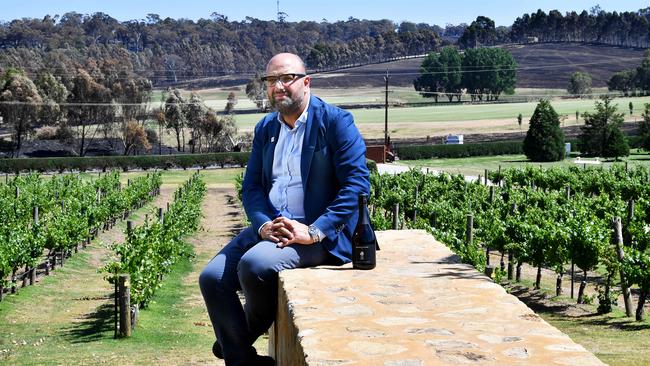
His business might be among the first to impose this requirement but it will not be the last.
The politics of Covid-19 will change, particularly as Christmas approaches and fully vaccinated families want to visit loved ones interstate – even overseas.
Inoculation rates are lagging in the isolationist states of Western Australia and Queensland, where a slim majority of people aged 16 and over have had their first vaccine dose. Even there, though, this increasing majority will want to start exercising their freedom.
Around Australia, people will look at the United Kingdom and Europe, for example, where crowds are flocking to Test cricket, grands prix and other events as they learn to live with Covid-19 – thanks to vaccination. The success of South Australia and some other states in eliminating community transmission of Covid-19 has created a false, relatively widespread view that the virus can be permanently blocked from our community.
This fallacy is skewered by the red alert triggered by infected truck drivers carrying essential goods into SA. We cannot keep the virus out forever, just as we cannot permanently isolate the state. Adelaide hotel owners warning they might have to mothball buildings because of a downturn in interstate patrons is evidence of that.
As a senior Adelaide business leader told The Advertiser, there is an ominous sense in the community that we have put the pandemic on lay buy. Our leaders have been unable to forge a pathway to reopening after the initial success in suppressing the virus by closing borders.
National cabinet has discussed the integration of digital vaccine certificates – now able to be added to Apple and Google wallets – into state QR code check-in apps. But their application is alarmingly unclear. What is the point of adding them to digital wallets and apps if people don’t know what to do with them?
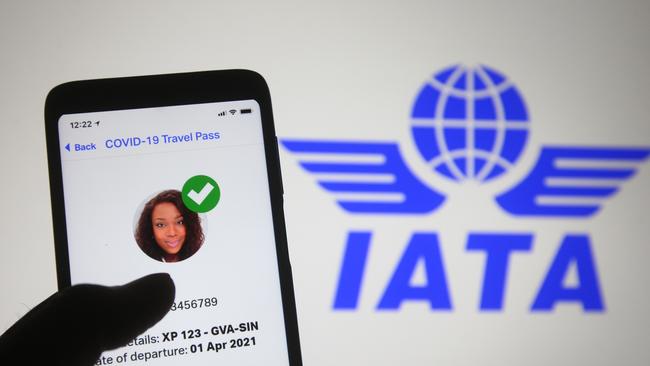
We already have effective introduced vaccine mandates, such as no jab, no pay policies for family tax benefit recipients to encourage childhood immunisation. No jab, no play policies vary by state.
In SA since last August, children must be fully immunised, be on an approved catch-up vaccination program or have an approved exemption to be able to enrol in and attend an early childhood service.
Open and honest debate is needed about vaccine mandates and passports. We cannot squash economic activity and mental health with lockdowns and border closures forever, particularly when more and more people are getting the jab.




